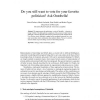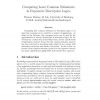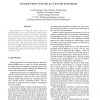276 search results - page 2 / 56 » E-learning by Doing with Computational Logic |
AGP
1994
IEEE
13 years 9 months ago
1994
IEEE
Kowalski and Sergot's Event Calculus (EC) is a formalism for reasoning about time and change in a logic programming framework. From a description of events which occur in the...
LREC
2010
13 years 6 months ago
2010
In this paper, we discuss our analysis and resulting new annotations of Penn Discourse Treebank (PDTB) data tagged as Concession. Concession arises whenever one of the two argumen...
FOMI
2009
13 years 3 months ago
2009
Abstract. The paper presents the preliminary version of Ontobella - a domain ontology of beliefs. The philosophical assumptions of this system are taken from the philosophy of Roma...
AUSAI
1999
Springer
13 years 9 months ago
1999
Springer
Computing least common subsumers in description logics is an important reasoning service useful for a number of applications. As shown in the literature, this reasoning service ca...
PERCOM
2005
ACM
14 years 4 months ago
2005
ACM
Many applications in eLearning utilize wireless networks (WLAN) as a carrier for data and communication. These networks in their basic form are insecure, protecting the communicat...



